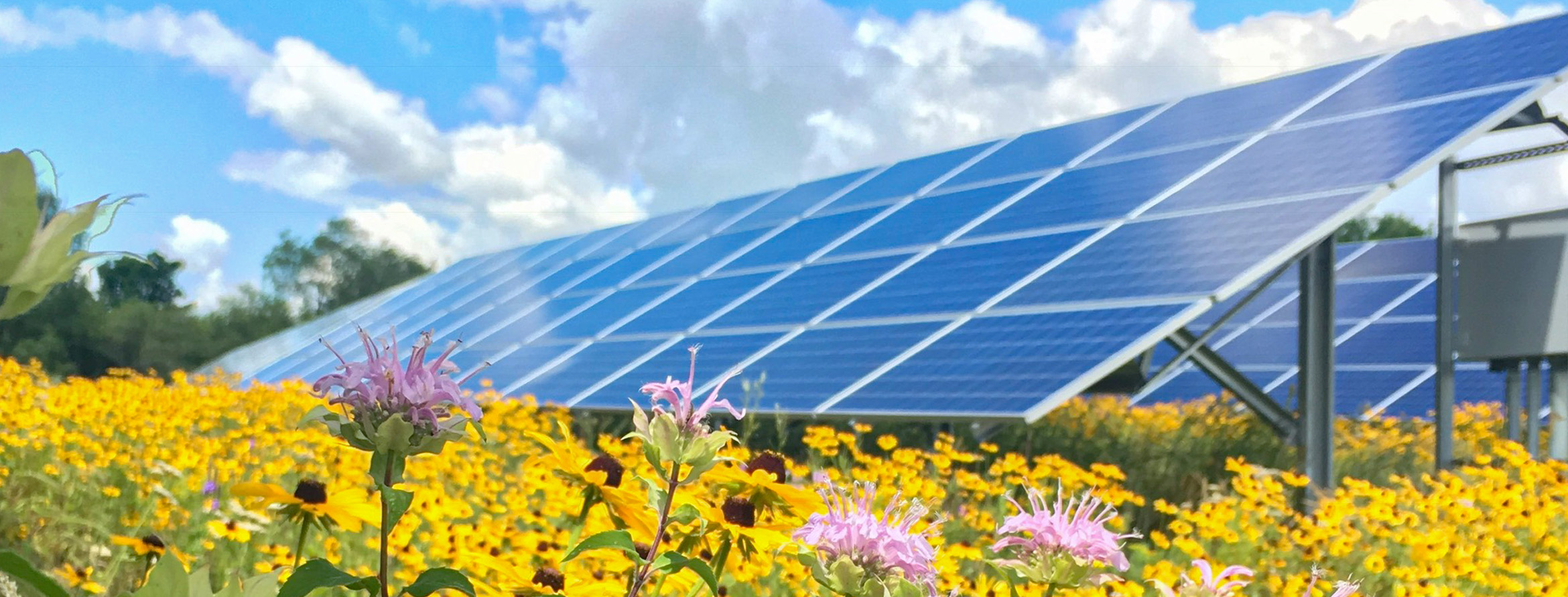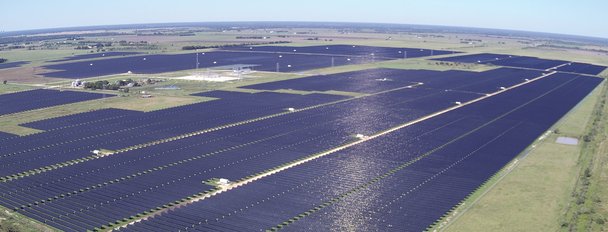
Cypress Creek Announces $100,000 Research Partnership with Cornell University
Cypress Creek Renewables, a leading national solar developer, today announced the launch of a groundbreaking study with Cornell’s College of Agriculture and Life Sciences to determine the ecological and economic benefits of planting pollinator-friendly wildflowers and habitat on solar farms in New York. The three-year, $100,000 partnership builds on Cypress Creek’s commitment to include abundant pollinator habitat at all of its solar projects in the state.
Pollinators—including bees, butterflies, and hummingbirds—are currently declining in North America and elsewhere. For example, of the 412 species of wild bees in New York, 53 species are known to be experiencing population declines, 42 are considered vulnerable, and one species was recently placed on the Federal Endangered Species List. Meanwhile, New York’s agricultural economy is highly dependent on bees, which are estimated to contribute $500 million in pollination services annually to crops such as apples, cherries, pumpkins, strawberries, blueberries, squash, and beans. Alfalfa, a primary food stock for dairy cows in New York State, also depends on pollinators.
As communities across the state increasingly demand access to clean, local energy, solar farms demonstrate an opportunity to generate more than affordable electricity and reverse the decline of New York’s pollinators. Considerable evidence suggests the loss of habitat is a leading cause of pollinator harm, and thus, improving habitat by planting native pollinator-friendly species on solar sites can likely have a rapid and measurable impact on the conservation and restoration of pollinator populations. To date, no studies in the US have quantified the benefits of pollinator-friendly plantings on solar sites. Until now.
The study, led by Dr. Scott McArt of the College of Agriculture and Life Sciences’ Department of Entomology, will determine the local benefits of wildflower plantings on solar sites in Central New York and the Hudson Valley, including potentially aiding in the restoration and conservation of declining bee species in the state. The research will seek to:
1. Determine whether wildflower plantings on solar sites bolster pollinator populations, especially rare and threatened bees; and
2. Assess whether wildflower plantings on solar sites boost visitation to crop flowers, to correlate with a greater yield of pollination-depended crops and result in economic benefits to growers.
Scott McArt, Professor and Lead Researcher at Cornell University, said “My lab at Cornell is excited to team up with Cypress Creek on a groundbreaking study to quantify and assess the benefits of wildflower plantings on solar farms in New York. Cypress Creek’s commitment to establish approximately 1000 acres of pollinator habitat, while at the same time assessing the best ways to design that habitat, is truly visionary and a fantastic example of industry commitment to pollinator conservation and health!”
Cate Parker, Associate Director of Community Partnerships at Cypress Creek, said, “In addition to generating clean, affordable energy, solar farms present an exciting opportunity to support pollinators and agricultural communities. We are delighted to partner with Scott McArt and Cornell University to quantify—for the first time in the United States—the local benefits of pollinator-friendly solar farms.”
Karen Sabath, Co-founder of Hudson Valley Natural Beekeepers, said, “Efforts to increase the forage available to pollinators are critical to improving the sustainability of honeybees and other essential pollinators. It is thrilling that Cornell University and Cypress Creek are taking an important step toward better understanding the ecological, agricultural, and economic benefits of pollinator-friendly solar farms in New York.”
Rob Davis, Director of the Center for Pollinators in Energy at Fresh Energy, said, “Agricultural leaders nationwide are urgently searching for land locations and resources that can help establish and maintain acres of pollinator-friendly landscapes. For honey bees as well as native pollinators, the plants under and around solar arrays can provide both healthy forage and safe refuge, all paid for with private-sector capital.”
Val Dolcini, President & CEO of the Pollinator Partnership, said, ““We applaud this important partnership between Cornell and Cypress Creek. More and more, renewable energy companies are realizing that providing habitat for pollinators makes good economic sense in addition to being good for the environment — a true ‘win-win.’ It’s a sustainable investment on every level and one that will bring good returns for all of us.”
Jordan Macknick, Principal Investigator of the National Renewable Energy Laboratory’s (NREL) InSPIRE study into low-impact solar development approaches, said, “Our modeling data shows that there are more than 6,400 acres of pollinator-dependent crops in the vicinity of existing New York large-scale solar sites. Future research, including this important work by Cornell University, will further refine and quantify the value of ecosystem and pollination services that can be provided to agriculture from pollinator-friendly PV solar arrays.”
Ellen Conrad, Co-president of Bedford 2020, said, “Bedford 2020 applauds Cypress Creek for their leadership in engaging Cornell to perform critical research on both pollinators and agricultural productivity as it relates to Pollinator Friendly Solar. We are pleased to work with Cypress Creek, one of the first solar developers to embrace Pollinator Friendly Solar, and to join Bedford 2020’s Pollinator Friendly Solar Demonstration Project whose goal is to develop best practices and conduct research on a variety of issues arising from New York State’s Pollinator Friendly Solar initiative. We look forward to sharing the findings of both Cypress Creek and Cornell in the Demonstration Project.”




